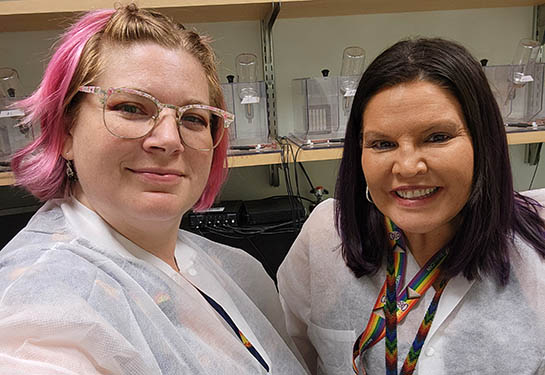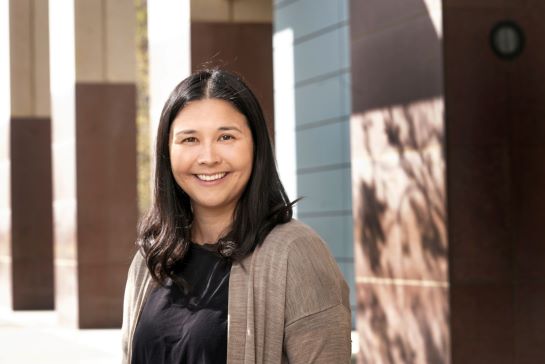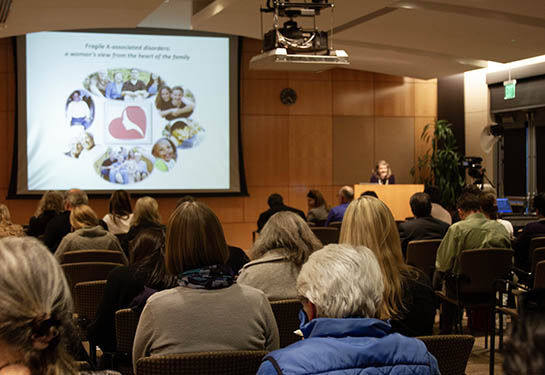A new employment model for people with autism and intellectual disabilities
MIND Institute researcher wins grant from California’s Department of Developmental Services to test new employment model
Over the past 20 years, more than 60,000 California students with autism and intellectual disabilities have graduated from high school. Most of them are unemployed or under-employed.
UC Davis MIND Institute Associate Director Marjorie Solomon is trying to change that.
Solomon was recently awarded a $552,000 grant from the California Department of Developmental Services (DDS) to pilot test a new supported employment model.
The model is called Individualized Placement and Support (IPS). IPS is successfully used to support employment in other conditions but has not been widely used in people with autism and intellectual disabilities. Solomon wants to find out how successful it is in helping autistic individuals and those with other developmental disabilities get and keep competitive, rewarding jobs.
“Having a job is one of the greatest sources of life satisfaction for most of us,” said Solomon, who is a professor in the UC Davis Health Department of Psychiatry and Behavioral Sciences. “It provides a sense of purpose and an income and increases social contacts and independence.”
Employment rates for autistic individuals and people with other developmental disabilities — particularly those with intellectual disabilities — are abysmal. According to DDS, only 19.6% of working-age consumers of the state’s regional centers were earning wages in 2020. Regional centers work with DDS to coordinate services for Californians with developmental disabilities. The average monthly wage for those working was $816.
“It’s a huge problem that so many people who want to work — and who have much to offer employers — are either unemployed or working very few hours in a non-competitive job. We need to change this,” Solomon said.
Many people with developmental disabilities have been working in what are called “sheltered workshops,” earning less than minimum wage and typically not interacting with other non-disabled employees. A 2021 California law phases out the practice and mandates that workers with disabilities be paid minimum wage by 2025.
What is IPS?
IPS is a model of support and care that is used widely to help people with serious mental illness develop the skills they need to live and work in the community. It was created at Dartmouth College and has been extensively studied and empirically validated.
Now, a few U.S. states have adapted this model to help adults with developmental disabilities find and maintain employment.
“A huge advantage to adapting this model is that it starts with the assumption that mental health and work go hand in hand,” Solomon said.
She notes that mental health conditions are a big challenge for many people with developmental disabilities. “If we ensure that people have the satisfaction of meaningful employment and a community of people to interact with, we’ll increase quality of life and reduce the cost of mental health care.”
If we ensure that people with autism and intellectual disabilities have the satisfaction of meaningful employment and a community of people to interact with, we’ll increase their quality of life and reduce poverty and the cost of mental health care.”—Marjorie Solomon, associate director, UC Davis MIND Institute
Solomon’s 18-month pilot test of IPS is a first for California. Her team is working with four Sacramento-area supported employment agencies, which help people with disabilities get jobs and provide coaching and assistance. The agencies have all agreed to use the IPS model, which includes:
- No exclusions (they’ll help just about anyone who wants to work)
- A commitment to competitive integrated employment (CIE), which means jobs that exist in the open labor market, are integrated with non-autistic or non-disabled workers and pay at least minimum wage with similar benefits as other workers
- A focus on the individual’s preferences and skills to target and customize the job
- Counseling on how to retain social security benefits
- Long-term job support
- Integration with other services, such as housing and transportation
The four partner agencies for the project include InAlliance, On My Own Community Services, Pride Industries and TKMomentum.
The pilot program is now underway; Solomon’s team recently received its first referral from one of the employment agencies.
“IPS is designed to help each person find a job that allows them to use their strengths and skills,” Solomon explained. “They have a job developer going out there and bird-dogging for them to find the right fit. This is better than sending resumes into a big black hole or having to interview for jobs which can be very difficult for persons with autism and intellectual disabilities. Then this job developer, who knows them and their new employer really well, becomes their job coach. This is much more effective for these unique employees.”
The researchers will gather data such as how many jobs people work, what their satisfaction level is, how many hours a week they work and how much they get paid to measure the program’s success. They’ll also work with the agencies throughout to ensure that IPS is being implemented correctly.
Solomon notes that quite often, when the job is customized, people end up working at the same place for many years.
“The really cool thing about IPS is that we start right away developing a job that you want and that you could do, with a boss who’s going to understand who you are, what they can expect from you and will customize a place for you,” Solomon explained. “Then, a job coach will be with you, maybe two or three times a week at first, then less often as you acclimate. It’s a recipe for success.”
Related Stories





